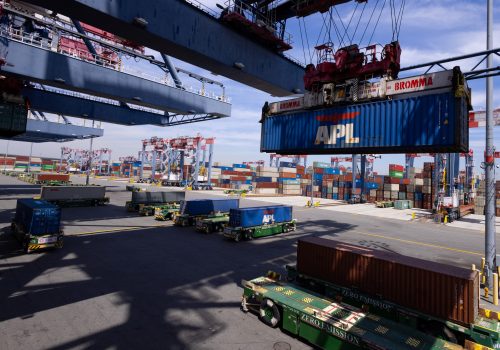The IMF warms to industrial policy—but with caveats
Industrial policy is making a comeback around the world. There’s no better sign of this than the new attention paid to subsidies by adherents of market liberalism like the International Monetary Fund (IMF), which has historically been very skeptical of them.
Times are changing and the IMF’s Fiscal Monitor released earlier this month documented this in detail. Policymakers are increasingly turning to subsidies to achieve a variety of objectives. The Fiscal Monitor documented the proliferation of industrial policy and, notably, offered a partial endorsement. The report also illustrates how economists’ views of industrial policy are evolving and where there is still disagreement.
What’s the IMF-approved version of industrial policy? In short, the IMF cautiously endorsed sector-specific interventions as a way to promote innovation, but remains skeptical of measures that get in the way of free trade.
The IMF’s case for industrial policy starts with the acknowledgement that innovation doesn’t happen under ideal market conditions. New ideas and inventions have positive spillovers (externalities) which means that the market, left to its own devices, won’t provide sufficient innovation.
That opens the door to policies like research grants or R&D tax credits that subsidize new research and inventions. Those economy-wide measures are known as “sector neutral” or “horizontal” industrial policy, and they tend to have more buy-in from economists. But the IMF’s Fiscal Monitor went further, outlining when and why “vertical” or sector-specific industrial policies can be worthwhile, too. The key, according to the IMF’s researchers, is to target sectors that either have especially high spillovers—where a breakthrough would improve productivity in lots of other arenas—or where there are other unresolved market failures at work. They cite clean energy and health care as examples.
“This Fiscal Monitor shows that well-designed fiscal policies to stimulate innovation and the diffusion of technology can deliver faster productivity and economic growth across countries,” the report concludes.
The IMF’s endorsement comes with a lot of caveats, which the researchers summarize:
In sum, industrial policy for innovation can only be beneficial if the following conditions hold:
- Externalities can be correctly identified and precisely measured (for example, carbon emissions).
- Domestic knowledge spillovers from innovation in targeted sectors are strong.
- Government capacity is high enough to prevent misallocation (for example, to politically connected sectors).
- Policies do not discriminate against foreign firms, so as to avoid triggering retaliation by trade partners.
They also note that larger, less open economies like the United States benefit more from such policies—because they capture more of the benefits of innovation subsidies.
The IMF is not the only international organization recognizing the case for industrial policy. The OECD’s researchers published an extensive and largely positive evaluation in 2022.
However, the IMF’s version of industrial policy isn’t necessarily the one most in vogue. Most notably, the Fiscal Monitor warns that “policies discriminating against foreign firms can prove self-defeating and trigger costly retaliation.” In a paper published in January, IMF researchers found that two-thirds of industrial policies enacted in 2023 distorted trade. So while the IMF may be warming to industrial policy in theory, it remains skeptical in practice.
Walter Frick is chief editor of the Atlantic Council’s GeoEconomics Center

At the intersection of economics, finance, and foreign policy, the GeoEconomics Center is a translation hub with the goal of helping shape a better global economic future.
Further reading
Wed, Oct 18, 2023
Designing a US-EU industrial and trade policy
Issue Brief By
Both sides of the Atlantic are confronting the geopolitical necessity of adapting trade and industrial policies to be fit for purpose in an increasingly competitive world. To avoid competition between Washington and Brussels, policymakers must recognize each side’s priorities and commit to further cooperation to bridge the transatlantic economic relationship, not widen it.
Sun, Apr 14, 2024
Our experts decode policymakers’ plans for the global economy at the IMF-World Bank Spring Meetings
New Atlanticist By
Atlantic Council experts were on the ground at the IMF-World Bank Spring Meetings to analyze whether the Bretton Woods institutions can guide the world through an uncertain recovery.
Mon, Aug 7, 2023
A year after the IRA, industrial policy has gone global. Now what?
EnergySource By David L. Goldwyn, Andrea Clabough
The domestic impacts of the IRA are undeniable. It is less certain what it means for the global energy transition. One year later, officials must prioritize opportunities to align with like-minded allies overseas.
Image: Tesla Gigafactory under construction, Austin, Texas, January 4, 2021.


